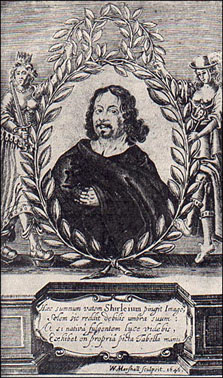| James Shirley  Born: 1596 Born: 1596
Birthplace: London, England
Died: 29-Oct-1666
Location of death: London, England
Cause of death: unspecified
Gender: Male
Race or Ethnicity: White
Occupation: Playwright Nationality: England
Executive summary: Love Tricks English dramatist, born in London in September 1596. He belonged to the great period of English dramatic literature, but, in Charles Lamb's words, he "claims a place among the worthies of this period, not so much for any transcendent genius in himself, as that he was the last of a great race, all of whom spoke nearly the same language and had a set of moral feelings and notions in common." His career of play writing extended from 1625 to the suppression of stage plays by parliament in 1642. He was educated at Merchant Taylors' school, St John's College, Oxford, and Catherine Hall, Cambridge, where he took his B.A. degree in or before 1618. His first poem, Echo, or the Unfortunate Lovers (of which no copy is known, but which is probably the same as Narcissus of 1646), was published in 1618. After proceeding to M.A. he was, Wood says, "a minister of God's word in or near St. Albans." In consequence apparently of his conversion to the Roman Catholic faith he left his living, and was master of St. Albans grammar school from 1623-25. His first play, Love Tricks, seems to have been written while he was teaching at St Albans. He removed in 1625 to London, where he lived in Gray's Inn, and for eighteen years from that time he was a prolific writer for the stage, producing more than thirty regular plays, tragedies and comedies, and showing no sign of exhaustion when a stop was put to his occupation by the Puritan edict of 1642. Shirley's sympathies were with the king in his disputes with parliament and he received marks of special favor from the queen. He made a bitter attack on Prynne, who had attacked the stage in Histriomastix, and, when in 1634 a special masque was presented at Whitehall by the gentlemen of the Inns of Court as a practical reply to Prynne, Shirley supplied the text -- The Triumph of Peace. Between 1636 and 1640 Shirley went to Ireland, under the patronage apparently of the earl of Kildare. Three or four of his plays were produced by his friend John Ogilby in Dublin in the theater in Werburgh Street, the first ever built in Ireland and at the time of Shirley's visit only one year old. On the outbreak of war he seems to have served with the earl of Newcastle, but when the king's fortunes began to decline he returned to London. He owed something to the kindness of Thomas Stanley, but supported himself chiefly by teaching, publishing some educational works under the Commonwealth. Besides these he published during the period of dramatic eclipse four small volumes of poems and plays, in 1646, 1653, 1655 and 1659. He "was a drudge" for Ogilby in his translations of the Iliad and the Odyssey, and survived into the reign of Charles II, but, though some of his comedies were revived, he did not again attempt to write for the stage. Wood says that he and his second wife died of fright and exposure after the great fire, and were buried at St. Giles's-in-the-Fields on the 29th of October 1666.
Shirley was born to great dramatic wealth, and he handled it freely. He constructed his own plots out of the abundance of materials that had been accumulated during thirty years of unexampled dramatic activity. He did not strain after novelty of situation or character, but worked with confident ease and buoyant copiousness on the familiar lines, contriving situations and exhibiting characters after types whose effectiveness on the stage had been proved by ample experience. He spoke the same language with the great dramatists, it is true, but this grand style is sometimes employed for the artificial elevation of commonplace thought. "Clear as day" becomes in this manner "day is not more conspicuous than this cunning"; while the proverb "Still waters run deep" is ennobled into "The shallow rivers glide away with noise / The deep are silent." The violence and exaggeration of many of his contemporaries left him untouched. His scenes are ingeniously conceived, his characters boldly and clearly drawn; and he never falls beneath a high level of stage effect. University: St John's College, Oxford University
University: BA, Catherine Hall, Cambridge University
Wrote plays:
Love Tricks, or the School of Complement (1625)
The Maides Revenge (1626)
The Wedding (1626)
The Brothers (1626)
The Wittie Faire One (1628)
The Gratefull Servant (1629)
The Traytor (1631)
Love's Crueltie (1631)
The Humorous Courtier (1631)
Changes: Or Love in a Maze (1632)
Hide Parke (1632)
The Ball (1632)
The Bird in a Cage (1633)
The Young Admirall (1633)
The Gamester (1634)
The Example (1634)
The Opportunity (1634)
The Coronation (1635)
The Lady of Pleasure (1635)
The Duke's Mistris (1636)
The Royall Master (1638)
The Polititian (1639)
The Gentleman of Venice (1639)
The Imposture (1640)
The Constant Maid, or Love will find out the Way (1640)
The Cardinal (1641)
The Sisters (1642)
The Doubtfull Heir (1652)
The Court Secret (1653)
Do you know something we don't?
Submit a correction or make a comment about this profile
Copyright ©2019 Soylent Communications
|